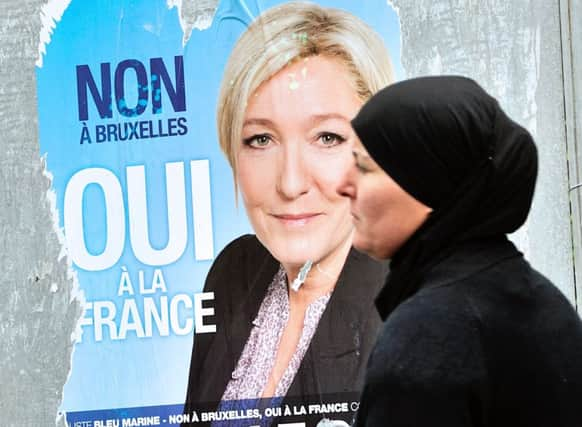EU lurches right as new kids on the bloc triumph


Anti-establishment parties of the far right and hard left more than doubled their representation amid voter apathy, harnessing a mood of anger with Brussels over austerity, mass unemployment and immigration.
The outright victory of the Front National in France set a precedent both nationally and Europe-wide.
Advertisement
Hide AdAdvertisement
Hide AdThe centre-right and centre-left – including Britain’s Conservatives and Labour – will continue to control more than half of the 751 seats in the EU legislature. But they face an unprecedented challenge from noisy rebels determined to stop business as usual in the 28-nation bloc.
French prime minister Manuel Valls called the breakthrough by Marine Le Pen’s anti-immigration, anti-euro Front National a political “earthquake”.
He countered rapidly yesterday by offering more tax cuts to spur a flatlining economy.
In Germany, the SPD/CDU coalition of Angela Merkel swept up many of the votes, but the far-right NPD, described by one British MEP as “openly racist”, will send one MEP to Brussels for the first time.
“We say Europe is the continent of white people and it should remain that way,” said leader Udo Voigt. In Copenhagen, the right-wing populist Danish People’s Party was celebrating after topping the polls.
Led by the beer-drinking Morten Messerschmidt, 34, who has been likened to Nigel Farage, it won nearly 27 per cent of the vote.
Finland’s anti-immigration Finns Party – capitalising on the worst recession in 20 years amid huge lay-offs at Nokia – increased its MEPs to two.
The anti-EU vote was amplified in many countries by a low turnout of just 43.1 per cent, but the pro-European centre ground held firm in Germany, as well as in Italy and Spain.
Advertisement
Hide AdAdvertisement
Hide AdFrance is a founder member of the EU and the weakness of president Francois Hollande may leave German chancellor Angela Merkel without a strong partner.
Economists say the next leg of European integration is vital to underpinning the single currency but leaves voters cold.
“The legitimacy of Europe is weakened, the legitimacy of France in Europe is weakened further,” said Dominique Moisi, of the French Institute of International Relations.
“To function, Europe needs a strong balance between France and Germany. But France is moving the way of Italy or Greece in economic terms and moving the way of Britain in its relationship with Europe.”
Centre-left Italian prime minister Matteo Renzi bucked the trend of anti-EU votes, scoring a stunning 41 per cent.
ANALYSIS
Trevor Salmon: Legacy of these elections could be the start of a better tomorrow – or the end of the EU
The 2014 direct elections are clearly different, at least in some respects. Clearly, given austerity, unemployment and immigration, some of the votes were a direct consequence of the electorate’s disquiet about their national situation, all of which have an international dimension.
In several states, fear about the consequences of globalisation and its impact on individuals’ lives, welfare and economic wellbeing was a factor. For example: France, Austria, Denmark, Greece and Ireland, where parties of the left and right gained significantly.
Advertisement
Hide AdAdvertisement
Hide AdBut in each of these states, and in others, there was also clear disenchantment with the way Europe is being run by the Commission, the European Parliament, and the member states.
In fact, there is a growing frustration that elites look after themselves and that individuals do not matter.
Indeed, there is a growing feeling that states do not matter either.
The biggest parties in the European Parliament, before and after the election – the European People’s Party (centre-right who have federalist tendencies) and the Progressive Alliance of Socialists and Democrats (main centre-left group) – have major issues to contend with.
They could pretend that the elections were just a mid-term protest and decide that they will carry on as before.
Or they could have a proper look at the results and try to ameliorate some of their previous policies.
There is clearly a division between those in the European People’s Party (led significantly by the Christian Democrats in Germany) who believe that to get to grips with the economic crisis there needs to be more integration, and those who believe – the radical right – that each state should have control of its own foreign policy and trade policy.
Legislation has to be passed by the parliament. Moreover, international trade deals have to be approved, as do new accessions to the EU, and changes to the treaties (i.e. any “reforms” will have to have parliament’s approval).
Advertisement
Hide AdAdvertisement
Hide AdIn the past, the parliament has held up trade deals with Israel (for a while) over that country’s human rights record, and almost vetoed the accession of Austria, Finland and Sweden in 1994.
In that year it was not the actual enlargement that was the problem, but some in the parliament were laying down a marker about the lack of democracy in the union.
So, in 2019 will people look back on 2014 and say “this was the beginning of the end of the European Union as a significant actor” or will it be “the beginning of a better tomorrow”?
• Professor Trevor Salmon is an international relations expert at Aberdeen University
SEE ALSO